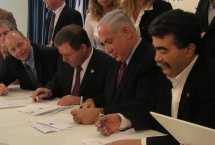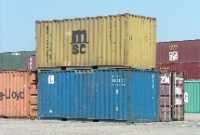Finance Minister Benjamin Netanyahu, Transportation Minister Meir Sheetrit, and Histadrut Labor Federation chairman MK Amir Peretz, signed last week the port reform agreement officially creating three competing port companies - Ashdod, Haifa, and Eilat.
Under the agreement, the port workers will receive a NIS 100,000 wage bonus over the next five years. ( NIS 50,000 at the beginning of the reform and NIS 50,000 in five years time )
In exchange, the port workers agreed to reduce the work force by some 400.
Port workers who retire on their own will, will enjoy a 16% increase to their pension for a period of 17 months.
The ports privatization, according to the agreement, will be carried out by a public issue only. 15% of the ports' shares will be floated in five years, and up to 49% will be floated from the sixth through the fifteenth year.
The government may reduce its holdings in the ports companies after 15 years, provided that the ports' cargo volume increases by at least 50%.
The red sea port of Eilat will be privatized in five years, while the others two will be privatized gradually, starting with the sale of 15 percent stakes, and which will be completed within 10 years. The full privatization of the ports will occur in 15 years.
The port workers union agreed not to launch strikes in the next five years.
The ports' assets will be transferred to a holding company that will replace the Ports Authority. The assets will be leased to the ports companies for 49 years, except for assets remaining in the hands of the ports companies.
The reforms set maximum fees for port services at current levels, which competition should drive down. The current problematic port fee structure will be further discussed in 2006.
Netanyahu welcomed the new agreement, saying that the port reform would benefit citizens who would gradually feel the difference in the form of savings worth thousands of shekels per household annually. Competition would lower fees, he explained. "That's how it was in the communications industry, and so it will be with the ports," he predicted.
Netanyahu added that as far as he could see port reforms would guarantee good labor relations, induce factories to stay at home, and create more jobs. "Manufacturers and those in the import/export business can, from now on, work in peace and quiet," said Netanyahu. Netanyahu called upon "factories that left the country because of long port strikes to return to Israel." He emphasized " We are beginning a new free and competitive era."
Transportation Minister Meir Sheetrit said at the signing ceremony that the "trials and tribulations of negotiations are always preferable to those of striking" Sheetrit noted that he would work to return the Zim's shipping company's transshipment activities to Israel, as he was promised by Zim's management, if the reforms took place.
Histadrut Labor Federation chairman, MK Amir Peretz, pledged full support of port reforms and structural changes in the port sector, in line with globalization.
Mr. Shraga Brosh president of the Israeli manufacturers Association noted that after a prolonged period shippers could now return to work without fear of imminent strikes.
He added that the agreement is highly important to the Israeli economy which could not go through another port strike. Brosh expressed no doubt that the agreement will achieve its goal and contribute to Israel's economic security.




